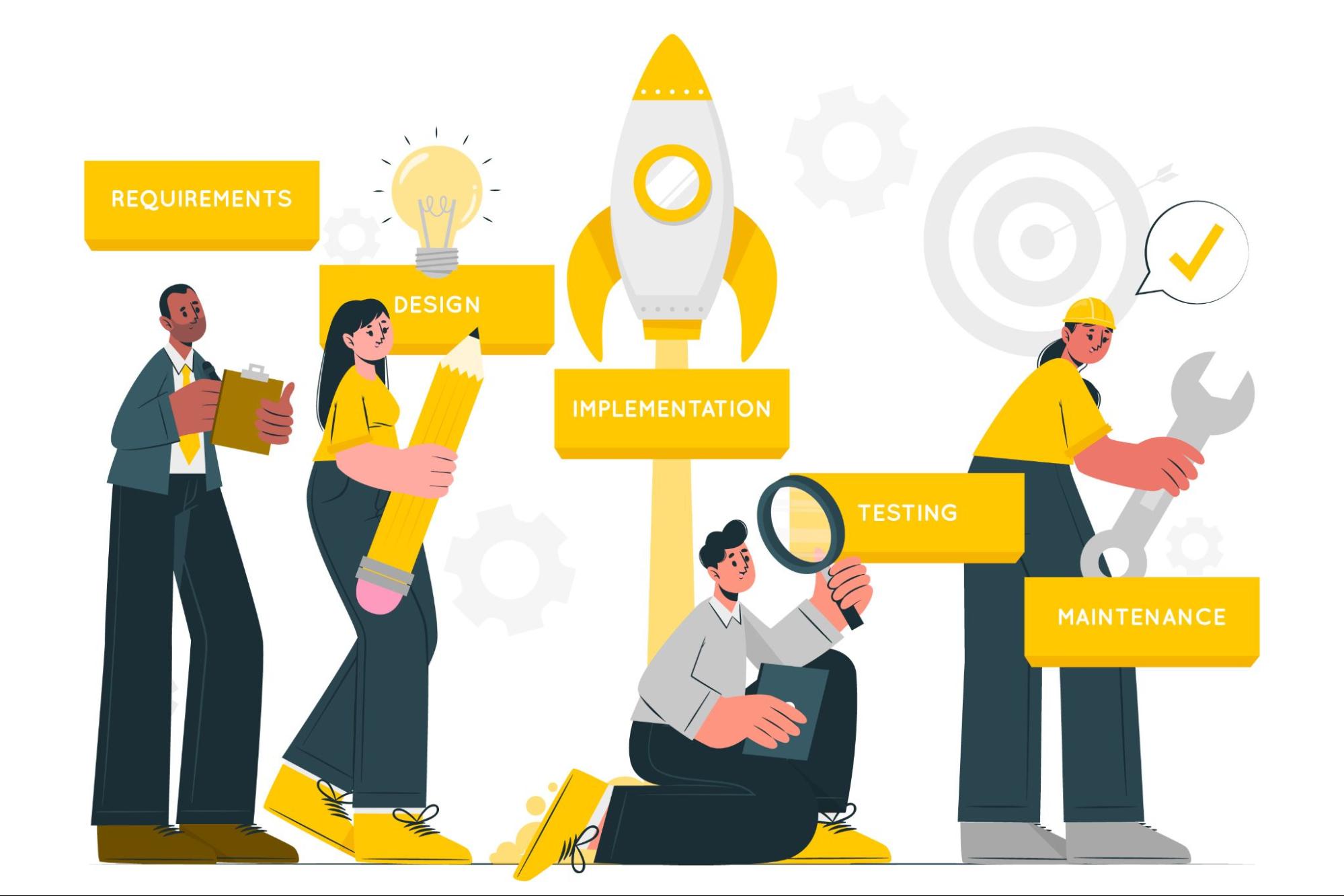

Is efficient project management the key to delivering projects on time and within budget, all while keeping stakeholders satisfied? If you're pondering this question, you're in the right place.
However, you must also be wondering what effective project management entails, which frameworks are the best to use, and what features are crucial in the software you choose.
Worry not!!!
Our comprehensive project management guide has all the answers and more that are worrying you. Dive in to discover the ins and outs of project management processes, the top frameworks, and how to ensure your project runs smoothly.
First things first. Let's start with the basics

Project management (PM) is mainly the practice of planning and overseeing projects from start to finish. It involves coordinating all activities and resources necessary to meet deadlines and achieve your project's objectives. Whether you're aiming to launch a new product, develop software, or organise a networking event, project management encompasses the following:
There are various structured frameworks available, such as Agile, Kanban, or Scrum, each offering a unique approach to project management. However, the goal remains consistent across all frameworks: to complete your project on time and within budget.
Effective project management is crucial as it provides the leadership, motivation, and problem-solving skills necessary for teams to introduce new products, drive revenue growth, and achieve company objectives. By prioritizing efficient project management practices, teams can proactively improve workflows, minimizing errors and overspending along the way.
The most successful companies understand the importance of effective project management, ensuring they remain efficient and productive in their endeavours.

Project management isn't exclusive to large corporations; organisations of all sizes, from multinational enterprises to small businesses, employ project management principles. Whether you're leading a local team or managing remote teams across the globe, effective project management is essential for achieving organisational goals.
Project management encompasses a diverse range of projects, including product and service development, software engineering, event planning, construction projects, marketing campaigns, and IT system implementations. Traditionally, a project manager oversees the project's overall success by assigning tasks, monitoring progress, and ensuring deadlines and budgets are met. However, in smaller teams lacking a dedicated project manager, multiple team members may share project management responsibilities.

Successful project management begins with establishing a clear roadmap to guide the project from start to finish. As Matt Burns, a project manager at monday.com, advises, "Before initiating any project, outlining the project roadmap is crucial. Without a map, you're likely to get lost."
Let's explore the five essential phases of the project management lifecycle:
Here's the high-level information you need to know about each.
Preparation is the first step in completing the work on time and within budget. During this phase, determine the following to create a strong project foundation:
Draw up a clear and feasible project plan to ensure that all team members move toward the same goal. During this phase, you'll:
During this process, you can also outline the team's project management methodology. There are many options to choose from.
During the execution phase, you will provide the details of your project deliverables so that your products are delivered on time. This stage occurs simultaneously with the monitoring and controlling phase and might involve:
Ultimately, it's about staying in control, collaborating with the entire team, and staying on track.
Constant monitoring is essential as it helps project managers answer the question: where are we exactly? vs. where should we have been by this point of time? Effective monitoring requires:
This is the final step, sometimes known as the project delivery phase. In this phase, you wrap up all activities and deliver the final product. This handover might be to the team leader, client, or an external stakeholder. Some additional components could be:

In project management, selecting the right framework is paramount as it shapes team structure, project planning, and monitoring approaches. Here's an overview of the leading project management types:
Waterfall, also known as traditional project management, emphasises comprehensive planning by meticulously scheduling the entire project from initiation to completion. This sequential approach progresses through defined stages, with each phase starting only after the previous one concludes.
Ideal for: Teams proficient in outlining all project requirements upfront and adhering to strict deadlines.
Agile methodology fosters an iterative approach, enabling teams to respond to project feedback swiftly. Particularly favoured in tech projects like software development, Agile prioritises adaptability, collaboration, and incremental delivery. Projects are divided into manageable iterations called sprints, with constant stakeholder feedback guiding adjustments.
Best suited for: Software development teams tackling complex projects with evolving requirements.
Kanban methodology centres on continuous improvement by visualizing and regulating workflow. Tasks are organised on a Kanban board, moving across columns representing various stages of work as the project advances. Unlike Waterfall's sequential nature, Kanban allows for ongoing adaptation, making it ideal for teams managing fluctuating workloads.
Perfect fit for: Projects requiring continuous flow and optimization, especially those involving maintenance tasks or unpredictable workloads.
Scrum, another popular Agile framework, divides projects into shorter sprints lasting 1–4 weeks. This framework establishes rules for team size, roles, planning, meetings, and deliverables, emphasising the delivery of functioning increments throughout the project lifecycle.
Optimal for: Teams aiming to deliver tangible progress increments, such as in marketing campaigns or product design endeavours.
Selecting the appropriate project management framework depends on factors like project complexity, team dynamics, and desired project outcomes. Each approach offers unique advantages, empowering teams to navigate diverse project landscapes effectively.

With effective project management, companies can innovate, streamline operations, and deliver value to customers with greater efficiency and less hassle. These fundamentals lay the groundwork for success, allowing organisations to harness resources like time and money more effectively. To guide you toward success in project management, here are eight tips to propel your organisation forward:
Many project failures stem from inadequate planning and research, which are vital in the early stages of a project. By establishing organisational priorities, objectives, and requirements upfront, you can minimise confusion and set a solid foundation for the project.
Selecting the right framework or methodology is crucial for successful project management. Whether you opt for a critical path methodology or the Waterfall approach, your choice will shape how you visualize, prioritize, and execute each stage of the project.
Transparency is key in managing project complexities and challenges. A culture of transparency encourages team members to communicate openly and take ownership of their work, fostering collaboration and accountability. Clear communication ensures that everyone understands long-term goals, KPIs, and their role in achieving them. Involving every employee in the planning process and giving them ownership over tasks can promote a sense of ownership and engagement.
Scope creep is a common challenge in project management, often resulting from unexpected work or changes. Involving the right stakeholders in the planning process can help accurately define the project scope and prevent deviations. Utilising past project data can also aid in setting realistic expectations and projections.
Creating realistic work schedules is crucial for maintaining productivity within your team and meeting project deadlines. Balancing workload with delivery dates ensures that tasks are completed on time without overburdening team members. Clearly communicated schedules help mitigate delays and prevent costly setbacks. The choice of project management methodology, such as Agile frameworks like Scrum, influences how teams communicate and allocate time to achieve goals. It's also important to allocate time for unforeseen circumstances and unexpected tasks.
Resource management involves pre-planning, scheduling, and allocating resources to optimise efficiency. These resources may include personnel, finances, and materials. For physical projects, such as construction, resource management may involve scheduling equipment and contractors to maximise productivity and minimise costs. In digital projects, resource management entails coordinating the workload of specific employees or teams to ensure timely task completion.
Stakeholders are individuals or groups with a vested interest in the project's success, such as clients, users, executives, or product managers. Effective communication and collaboration with stakeholders are essential for project success. Each stakeholder brings unique insights and perspectives that contribute to achieving organisational goals and meeting project requirements. Engaging stakeholders throughout the project lifecycle ensures alignment with objectives and fosters a sense of ownership and accountability.
In today's remote work environment, leveraging modern project management tools is essential for efficient collaboration and task management. A comprehensive Work OS platform, like monday's project management platform, facilitates inter-departmental collaboration, cloud file sharing, and customizable workflows tailored to your company's specific needs. With features designed to streamline project planning, execution, and monitoring, these tools empower teams to achieve their goals effectively and adapt to evolving project requirements.

While basic tools like spreadsheets, email, and whiteboards suffice for simple projects, larger and more complex endeavours demand a robust project management platform. Transitioning to a digital workspace like Monday PMO work management can significantly empower project teams. Here's how:
Clear project documentation records key details essential for planning and executing successful projects. This documentation becomes even more critical when coaching multiple teams on specific project management methodologies. With a Work OS like Monday, teams can create, share, and collaborate on documents seamlessly within their workflow, ensuring everyone understands the project flow and their roles in real-time.
A project roadmap provides a visual, high-level overview of project goals and deliverables arranged on a timeline. This aids in managing stakeholder expectations, communicating plans, and coordinating resources with other teams. Project management software facilitates the creation of dynamic and accessible project roadmaps, with customizable templates available to kickstart the process efficiently.
Once a roadmap or high-level project plan is in place, it's crucial to develop customised workflows to streamline task execution and progress monitoring. Work OS platforms offer customizable templates to accommodate different project methodologies, allowing teams to add various views, automation, and more to suit their specific needs.
Resource management features in monday.com enable project managers to understand individual team member capacities and assign tasks accordingly. This empowers team members to take ownership of their work, with automations in place to notify task owners of completed project phases. Encouraging team members to report progress during status meetings and identify roadblocks fosters transparency and momentum.
Dynamic dashboards display actionable insights to facilitate faster decision-making. Key data points such as time tracking, project status, and deadlines are readily accessible, enabling stakeholders to track project progress and identify bottlenecks. Teams can assess project success against KPIs and use this data to guide future decisions.
Automation plays a crucial role in streamlining project management workflows. Tasks like notifying managers of overdue deadlines or creating recurring task items can be automated, saving time and reducing manual effort. Work OS platforms offer pre-prepared automation templates or allow users to create custom workflows tailored to their project requirements.
By embracing digital project management tools like monday.com, teams can enhance collaboration, streamline processes, and drive project success in today's dynamic business environment.

Project management is evolving rapidly, driven by various trends that reshape how we work. One significant trend generating a lot of excitement is the integration of artificial intelligence (AI) into project management practices. AI holds the promise of automating repetitive tasks and providing valuable insights, enhancing efficiency and productivity. To meet this demand, monday.com has introduced an AI Assistant, currently in beta version, which offers a range of generative AI capabilities. These include automating task creation, composing emails, building formulas, and summarising information.
In addition to AI, three other emerging trends will influence project management in the near future:
While we've discussed project management phases, frameworks, tips for success, and future trends, it's essential not to overlook the critical role played by the project team. The success of any project hinges on selecting the right people to drive it from inception to completion.
Considering these trends, let's explore how to ensure you assemble the right team for your project.

Creating an effective project team is crucial for successful project management. The structure of your team depends on various factors, such as your chosen framework and the scope of the project. However, some proven strategies can help you build a productive and successful team.
Building a diverse project team often involves sourcing talent from different departments within your organisation. This approach allows you to leverage the expertise and insights of individuals with varied backgrounds and skill sets. Rather than seeking external hires, consider tapping into the existing resources within your company. For instance, if you're launching a new marketing campaign, you may need input from website designers, copywriters, and product managers who are already part of your internal teams. Utilising a Work OS can help you identify and showcase the skills of internal employees, enabling you to build stronger teams for your projects.
Selecting the right project manager is critical for the success of any project. Your project manager could be a professional with expertise in project management or a subject matter expert (SME) who possesses deep knowledge of the project area. A professional project manager may take on a facilitating role during the initial planning stages, allowing stakeholders and SMEs to contribute their insights and shape the project plan. In smaller companies where a dedicated project manager may not be feasible due to budget constraints, an SME or executive with relevant experience can assume the role of project manager.
A project manager is responsible for the day-to-day management of a project and its people. They must also manage these six aspects:
Encouraging an "all hands on deck" approach is essential for fostering a culture of ownership and collaboration within your project team. Empowering team members to exercise their judgement and take ownership of tasks can promote a sense of accountability and drive momentum from the outset of the project. Providing clear expectations and complete transparency about project objectives and responsibilities in the early stages is crucial for setting the tone for success.
With the increasing prevalence of remote work, it's vital to have flexible tools that can accommodate different teams and projects seamlessly. This is where the right project management software becomes invaluable. By leveraging such tools, you can ensure that your project team stays aligned, productive, and focused on delivering successful outcomes.

Successful project management requires understanding the right approach to meet your needs and how to match this up with the right Work OS platform. Optimizory offers comprehensive solutions such as RMsis and LXP to help you quickly manage any project management methodology. Now you've reached the end of our project management guide, why not sign up today to see for yourself?